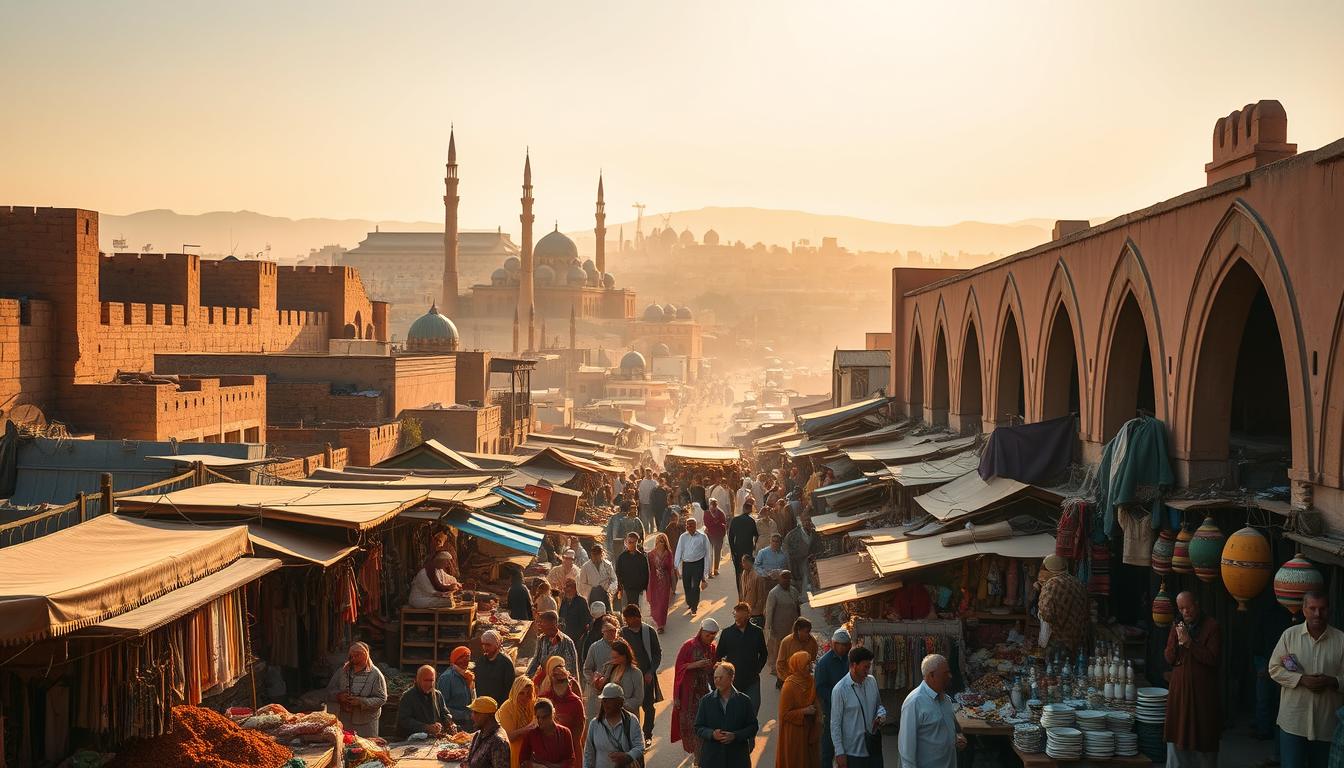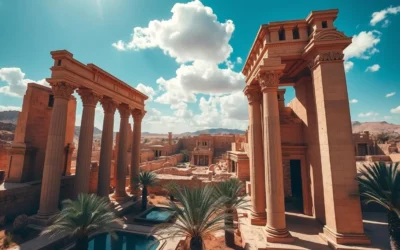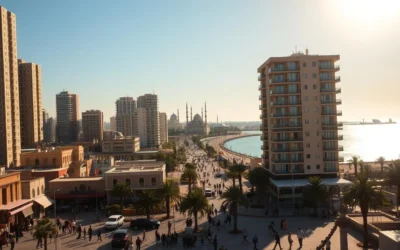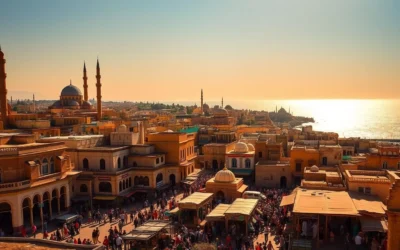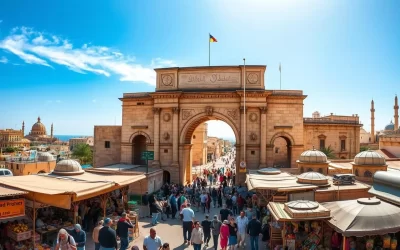Did you know that only about 30 tourists visit Libya each month? This makes it one of the least explored countries in the world. If you’re planning a trip here, you’re in for a unique adventure filled with history, culture, and challenges.
This guide is designed to help you navigate everything from visa requirements to government regulations. As a citizen of the United States, you’ll need to plan carefully. The country operates on a cash-based system, so carrying local currency is essential.
Libya’s rich history and stunning landscapes make it a fascinating destination. However, safety concerns and limited infrastructure mean you’ll need to stay informed. Whether you’re visiting the international airport or exploring ancient ruins, this guide has you covered.
Understanding Libya’s Rich History and Current Landscape
Libya’s history is a tapestry of colonial rule, revolution, and resilience. From its time under Italian control to the rise of Colonel Gaddafi, the country has undergone significant transformations. These changes have shaped its present-day landscape, making it a unique but challenging destination.
Colonel Gaddafi’s Legacy and Political Shifts
Colonel Muammar Gaddafi ruled the country for over four decades, leaving a lasting impact on its governance and society. His regime, marked by authoritarian rule, ended during the Arab Spring in 2011. This event triggered a series of political shifts that continue to influence the country today.
Following Gaddafi’s fall, Libya’s government became fragmented. Multiple factions and militias now vie for control, creating a complex power dynamic. For example, Tripoli and Benghazi are often centers of conflict, reflecting the broader struggle for authority.
Modern-Day Libya: Power Dynamics and Security
In modern-day Libya, militia activity is a significant factor in daily life. Security measures are strict, especially in areas like Tripoli International Airport, which has been closed since 2014 due to ongoing clashes. Mitiga Airport now serves as the primary civilian hub, but travelers should remain cautious.
Understanding the government’s policies is crucial for any visit. The country’s security protocols, influenced by its turbulent past, directly affect your experience. For instance, foreign nationals are often viewed as high-value targets, particularly in the south.
Despite these challenges, Libya’s rich history is evident in its landmarks. Places like the ancient city of Leptis Magna offer a glimpse into its storied past. These sites serve as reminders of the country’s resilience and cultural heritage.
The Travel Experience: What You Need to Know about Visiting Libya
Planning a trip to this North African destination requires careful preparation and understanding of its unique travel dynamics. Unlike many other countries, independent travel here is nearly impossible. You’ll need to work with certified tour companies to navigate the process smoothly.

Tourism Infrastructure and Visa Requirements
The tourism infrastructure in this region is limited, so setting realistic expectations is key. Most travelers enter through the international airport in Tripoli, which serves as the primary gateway. Once through customs, you’ll find that your experience is highly managed by your tour company.
Obtaining a visa is a crucial step. The country has implemented an eVisa system, which simplifies the process. However, you’ll still need to work with an authorized company to secure your documents. The eVisa typically takes about a week to process and costs around $125.
“Traveling here is a controlled experience, but it’s also one of the most rewarding adventures you’ll ever have.”
Engaging Tour Companies and Their Role
Certified tour companies play a vital role in your journey. They handle everything from visa applications to hotel bookings and itinerary planning. This ensures a seamless experience, especially given the region’s complex regulations.
Here’s a quick overview of some major companies and their services:
| Company | Services Offered |
|---|---|
| Libyan Adventures | Visa assistance, guided tours, hotel bookings |
| Desert Treks | Custom itineraries, transportation, security |
| Heritage Tours | Cultural experiences, historical site visits |
When planning your trip, verify your hotel arrangements in advance. While accommodations are affordable, amenities may be basic. Staying with a group ensures safety and access to essential services.
As a U.S. citizen, you’ll find that the experience is unlike any other. While challenges exist, the rewards of exploring this unique destination are unparalleled. With the right preparation, you’ll have an unforgettable adventure.
Visa Application Process and Essential Documentation
Understanding the visa requirements is the first step to ensuring a smooth entry into this unique country. The process may seem complex, but with the right preparation, it’s manageable. Here’s a breakdown of what you need to know.
Choosing a Reliable Tour Company
Working with a certified tour company is essential. They handle everything from paperwork to logistics, ensuring a hassle-free experience. Companies like Sherwes Travel specialize in guiding travelers through the visa process, saving you time and stress.
Step-by-Step Visa Submission and Approval
Here’s a step-by-step guide to the visa application process:
- Gather Required Documents: You’ll need a valid passport, two passport-sized photos, proof of financial stability, and health insurance. Ensure your passport has at least six months of validity.
- Submit Your Application: Most applications are submitted via courier to the embassy. Include all necessary documents and pay the required fee, which is typically around $125.
- Wait for Approval: Processing usually takes about a week, but delays can occur. Stay in touch with your tour company for updates.
- Receive Your Visa: Once approved, your visa will be sent to you. Double-check all details to avoid issues at the international airport.
Here’s a list of critical documents you’ll need:
- Valid passport with at least six months of validity
- Two recent passport-sized photos
- Proof of financial stability (bank statements)
- Health insurance covering your entire stay
- Flight itinerary and hotel bookings
The embassy and government play a key role in authorizing visas. Ensure all information is accurate to avoid delays. In one case, a traveler missed a flight due to incorrect details on their visa. Double-check everything before submission.
“Proper planning and attention to detail make the visa process smooth and stress-free.”
Real-life processing times vary, but most travelers receive their visas within 7-10 days. Engaging a reliable tour company ensures you avoid common pitfalls and enjoy a seamless experience.
Exploring Payment Options in Libya
Navigating payment methods in a foreign country can be tricky, but with the right knowledge, you’ll feel confident. In this destination, cash is king, especially for small purchases. While ATMs exist, they’re not always reliable, so carrying local currency is essential.
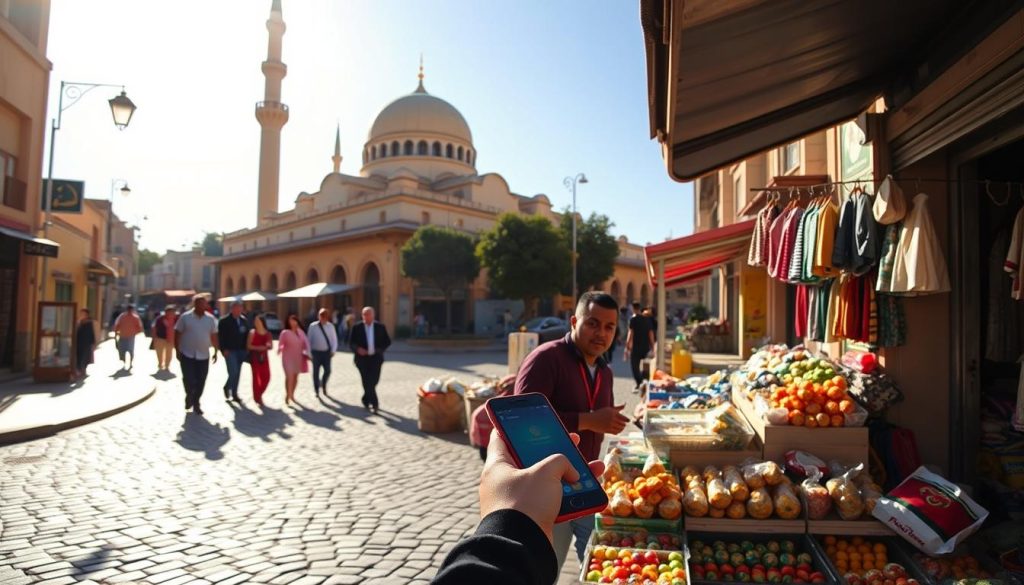
For larger transactions, prepaid travel cards and mobile payments are becoming popular. These options often have lower conversion fees compared to credit or debit cards. However, availability can vary, so it’s wise to have a backup plan.
Using Cash and ATMs
Cash is the most widely accepted form of payment here. ATMs are available in major cities, but they may not always work. It’s a good idea to exchange money upon arrival and keep some extra for emergencies.
Small vendors and local markets typically prefer cash. This makes it easier to negotiate prices and avoid hidden fees. Always carry small denominations for convenience.
Credit/Debit Cards, Mobile Payments, and Prepaid Travel Cards
Credit and debit cards are accepted in some hotels and larger businesses. However, their use is limited outside tourist areas. Mobile payment services like Apple Pay and Google Pay are gaining traction but aren’t universally available.
Prepaid travel cards are a smart choice for managing expenses. They offer competitive exchange rates and reduce the risk of carrying large amounts of cash. Plus, they’re easy to reload if needed.
“Having multiple payment options ensures you’re prepared for any situation during your trip.”
Some tour companies require cash payments upon arrival. Be sure to confirm this in advance to avoid surprises. Keeping an eye on exchange rates throughout your trip can also save you money.
By understanding these payment methods, you’ll navigate the local financial system with ease. Whether you’re traveling solo or with a group, being prepared ensures a smooth and enjoyable experience.
Currency Fundamentals: The Libyan Dinar
When traveling to a new country, understanding its financial system is crucial for a smooth experience. In this destination, the official currency is the Libyan dinar. It’s the only accepted form of money for all transactions, making it essential to familiarize yourself with its usage and value.
Understanding the Official Currency
The Libyan dinar is issued and regulated by the country’s government. It’s divided into smaller units called dirhams, which are useful for smaller purchases. While the dinar is widely accepted, it’s important to note that foreign currencies are rarely used in local markets.
Before your trip, consider exchanging your currency to dinars. This preparation can save you time and avoid potential delays. Many travelers find it helpful to carry a mix of cash and prepaid travel cards for flexibility.
Exchange Rates and What They Mean for You
Exchange rates for the Libyan dinar can fluctuate, impacting your travel budget. Monitoring live rates using online tools can help you make informed decisions. Websites like XE or OANDA provide real-time information on currency values.
Here are some tips to manage exchange rates effectively:
- Check rates regularly before and during your trip.
- Avoid exchanging large amounts at airports, where rates are often less favorable.
- Use local banks or authorized exchange offices for better rates.
Understanding these dynamics ensures you get the most value for your money. By staying informed, you can navigate the local financial system with confidence.
“Being prepared with the right currency and knowledge makes your travel experience seamless and stress-free.”
Finally, familiarize yourself with local banking practices to avoid unexpected fees. Some banks may charge for currency conversion or ATM withdrawals. Planning ahead ensures you’re ready for any financial situation during your journey.
Cost Breakdown for Traveling in Libya
Budgeting for your journey in this North African country requires attention to detail. From meals to transportation, understanding the costs involved will help you plan better. Let’s break down the typical expenses you’ll encounter during your trip.
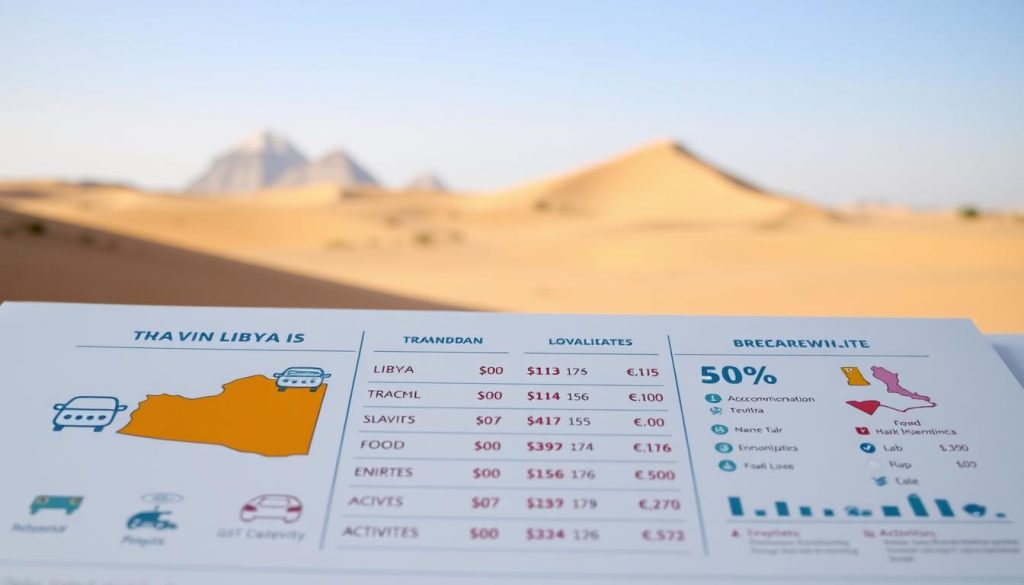
Daily Expenses: Food, Transport, and Entry Fees
Your daily budget will depend on your preferences. For example, a meal at a local restaurant costs around $3-$5, while a pizza might set you back $3. Street food is even more affordable, making it a great option for saving money.
Transportation costs vary. Local taxis are inexpensive, with short rides costing around $2. However, renting a car can be pricier due to limited supply. Entry fees to historical sites like Leptis Magna are typically $5-$10 per person.
Hidden Fees and Security Charges
Be prepared for additional costs. Mandatory tips for guides are common, usually around $5-$10 per day. Security charges may also apply, especially if you’re traveling with a tour company. These fees ensure your safety but can add up quickly.
Accommodation is relatively affordable. A 3-star hotel costs around $30 per night, but amenities may be basic. Always confirm your hotel arrangements in advance to avoid surprises.
“Tracking small expenses and negotiating prices can make a big difference in your overall budget.”
Here are some tips to manage your money effectively:
- Carry cash for small purchases and tips.
- Keep receipts for all transactions to avoid disputes.
- Negotiate prices where possible, especially in local markets.
By understanding these costs, you’ll be better prepared for your trip. Whether you’re a U.S. citizen or traveling from elsewhere, careful planning ensures a smooth and enjoyable experience.
Flight and Airport Insights
Navigating flights and airports in this region can be challenging but rewarding with the right preparation. Whether you’re flying from the United States or another gateway city, understanding the process ensures a smooth journey. This section covers everything from booking your flight to navigating the airport upon arrival.
How to Book and What to Expect at Terminal
Booking your flight is the first step. Major gateway cities include Tunis and Tripoli, with airlines like Tunis Air, Afriqiyah, and Libyan Wings offering regular services. Using online travel agencies (OTAs) can simplify the process, but always verify your booking details.
Common issues like flight cancellations can disrupt your plans. In such cases, stay in touch with your airline for updates. Having a backup plan, such as alternative flight options, can save you time and stress.
Upon arrival, you’ll need to declare currency if carrying more than the allowed limit. Customs procedures are straightforward but thorough, so ensure all documents are ready. The terminal experience varies, but exchange areas and ride-share services are usually accessible.
| Step | Details |
|---|---|
| Currency Declaration | Declare amounts over the limit at customs. |
| Customs Check | Have your passport and visa ready for inspection. |
| Exchange Areas | Locate currency exchange counters for local cash. |
| Ride-Sharing | Use ride-share apps or taxis for transportation. |
For a smoother experience, plan your trip during less busy times of the month. Early mornings or weekdays often have fewer crowds. Travelers from the United States should also account for time zone differences when scheduling flights.
“Preparation and awareness are key to navigating flights and airports in this unique destination.”
By following these tips, you’ll be well-prepared for your journey. Whether you’re a seasoned traveler or visiting for the first time, understanding the process ensures a stress-free experience.
Staying Connected: Communication and Internet in Libya
Staying connected during your trip is essential, but it comes with its own set of challenges. Internet connectivity in this region can be unreliable, especially in hotels and remote areas. However, with a little preparation, you can manage your communication needs effectively.
One of the biggest hurdles is the system for internet access. Hotel Wi-Fi is often slow or unavailable, making it difficult to stay online. For a more reliable connection, consider purchasing a local SIM card with a generous data package. This ensures you have access to information and can stay in touch with loved ones.
When using limited bandwidth, prioritize essential tasks. Avoid uploading large files or streaming videos, as these can quickly drain your data. Instead, focus on sending messages or checking emails. This approach helps you make the most of your connection.
Certain site locations, like major airports or cafes, offer more reliable connectivity. Plan your online activities around these spots to ensure smoother access. For example, you might schedule updates or uploads during a stop at a café.
“Even with connectivity challenges, basic communication can be maintained with the right tools and planning.”
For U.S. citizens, staying connected is about balance. While you may not have constant access to high-speed internet, you can still share updates and enjoy your travel experience. By following this guide, you’ll navigate connectivity issues with ease.
Lastly, don’t forget to enjoy the local food and culture. Staying connected is important, but so is immersing yourself in the destination. With these tips, you’ll stay informed and make the most of your journey.
Securing Your Belongings and Ensuring Your Safety
Your safety is a top priority when traveling to unfamiliar destinations. In this region, security measures are comprehensive, designed to protect visitors while ensuring a smooth experience. Understanding these protocols helps you stay prepared and confident throughout your journey.
Understanding Local Security Measures
Tourists often receive layered security support, including assigned police escorts and additional personnel. These measures are in place to safeguard you, especially in areas with heightened risks. For example, many travelers report being accompanied by both uniformed and plain-clothed agents during their visits.
Local militia and official forces are visibly present in key locations, such as airports and hotel entrances. Their presence is a reminder of the region’s commitment to visitor safety. While it may feel overwhelming, these measures are designed to ensure your protection.
Tips for Safe Interactions and Documentation
Interacting with locals and officials requires awareness and respect. Always carry your identification and travel documents securely. Here are some practical tips to stay safe:
- Keep copies of your passport and visa in a separate location.
- Avoid displaying large amounts of cash or valuables in public.
- Follow instructions from security personnel without hesitation.
One traveler shared how their group was escorted by a police team during a visit to a historical site. This experience highlighted the importance of adhering to local protocols for everyone’s safety.
“Following security guidelines ensures a smooth and worry-free travel experience.”
By staying informed and prepared, you can navigate these measures with ease. Whether you’re from the United States or another country, these steps help you enjoy your trip while prioritizing your safety.
Navigating Local Cultural Norms and Legal Regulations
Understanding local customs and laws is essential for a smooth travel experience. Respecting cultural norms and adhering to legal rules not only ensures your safety but also helps you connect better with the local community. This section provides practical guidelines to help you navigate these aspects with ease.
Do’s and Don’ts for Travelers
When visiting a new place, being mindful of local practices can make a big difference. Here are some key do’s and don’ts to keep in mind:
- Do dress modestly, especially in public areas. This is particularly important for women to avoid unwanted attention.
- Don’t take photos of government buildings or military installations without permission. This can lead to serious legal consequences.
- Do carry your passport and visa at all times. Authorities may ask for identification during routine checks.
- Don’t engage in public displays of affection, as this is considered inappropriate in many local cultures.
Following these simple guidelines ensures you stay respectful and avoid unintentional offenses.
Legal Restrictions and Their Implications
Local laws are strictly enforced, and violations can result in severe penalties. For example, photographing sensitive areas like airports or government facilities is prohibited. If caught, you could face fines or even detention.
Women travelers should be aware of specific cultural expectations. Dressing conservatively and avoiding solo outings at night can help minimize risks. Always prioritize your safety and follow local advice.
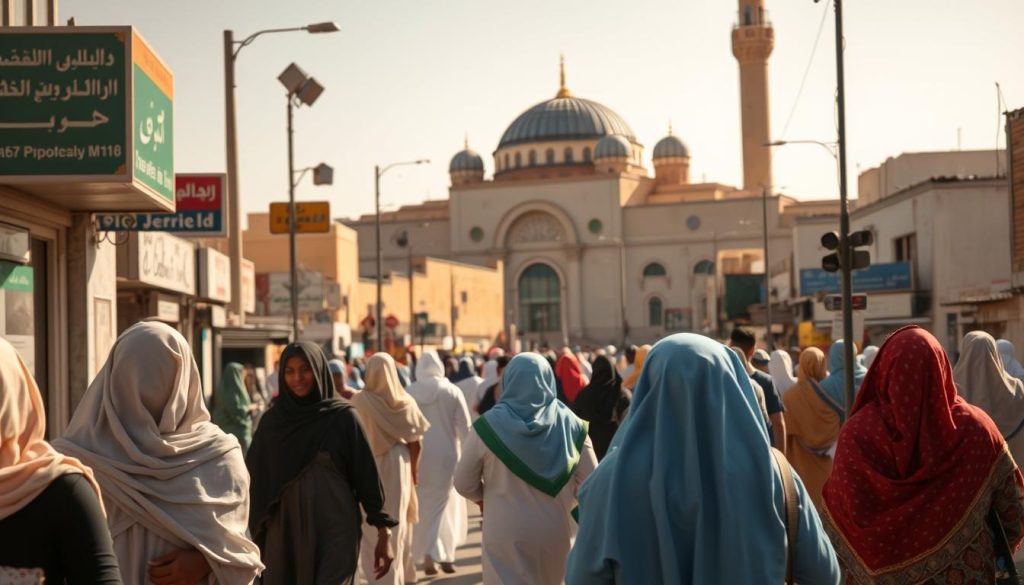
| Aspect | Guidelines |
|---|---|
| Photography | Avoid taking pictures of government or military sites. |
| Dress Code | Wear modest clothing, especially in public areas. |
| Documentation | Carry your passport and visa at all times. |
| Behavior | Refrain from public displays of affection. |
By staying informed and respectful, you can enjoy your trip while adhering to local norms and laws. Whether you’re a U.S. citizen or visiting from another country, these tips ensure a smooth and enjoyable experience.
Unique Features of Libyan Tour Itineraries and Agendas
Your journey in this region will be shaped by carefully structured tour agendas. These itineraries are designed to balance historical exploration with safety, ensuring you have a memorable experience. Most tours last around seven days and include visits to UNESCO World Heritage Sites like Leptis Magna and Sabrata.
A typical day starts early, with transportation arranged by your guide. You’ll visit historical landmarks, enjoy local food, and return to your hotel by evening. However, flexibility is key, as schedules may change due to security concerns.
Standard Tour Agendas and Schedule Adjustments
Most tours follow a similar structure, but adjustments are common. For example, a planned visit to a historical site might be rescheduled if security conditions change. Your group will be informed promptly, and alternative activities will be arranged.
Here’s what a standard day might look like:
| Time | Activity |
|---|---|
| 8:00 AM | Breakfast at the hotel |
| 9:00 AM | Guided tour of a historical site |
| 1:00 PM | Lunch at a local restaurant |
| 3:00 PM | Visit to a cultural landmark |
| 6:00 PM | Return to the hotel |
Delays can occur, especially during flight transfers or entry checks. Having a flexible mindset ensures you stay calm and enjoy your trip despite unexpected changes.
“Adapting to last-minute adjustments is part of the adventure in this unique destination.”
For travelers from the United States, these itineraries provide a structured yet adaptable way to explore the region. By staying informed and flexible, you’ll make the most of your time here.
Choosing the Right Accommodation for Your Trip
Finding the right place to stay can make or break your travel experience. In this country, accommodation options range from budget-friendly stays to mid-range hotels. While choices may be limited, selecting the right hotel ensures comfort and convenience during your journey.
Common challenges include inconsistent service and unreliable Wi-Fi. Some travelers have reported issues with key cards and amenities like electricity and showers. These problems can disrupt your stay, so it’s essential to research your options thoroughly.
To avoid surprises, check reviews and confirm details with your tour company in advance. A 3-star hotel typically costs around $30 per night, offering basic amenities. While this is affordable, ensure your chosen place meets basic standards for safety and comfort.
Here are some tips to help you choose wisely:
- Verify the location for convenience and security.
- Ask about Wi-Fi availability and other essential services.
- Confirm payment methods, as some hotels may require cash.
As a U.S. citizen, you’ll want to ensure your accommodations align with your expectations. Balancing comfort and budget is key, especially in a country with limited tourism infrastructure. By planning ahead, you can enjoy a smoother and more enjoyable stay.
“Choosing the right accommodation ensures your trip is both comfortable and stress-free.”
Finally, prioritize safety when selecting your hotel. Ensure it’s located in a secure area and has proper security measures in place. This way, you can focus on exploring the country without worrying about your well-being.
Managing Money and Avoiding Financial Pitfalls
Managing your finances wisely is key to a stress-free travel experience. Whether you’re exchanging currency or handling daily expenses, a little planning goes a long way. Here’s how to avoid common financial pitfalls and make the most of your budget.
Best Practices for Currency Exchange
When exchanging currency, avoid airport counters. They often offer poor rates and high fees. Instead, use local banks or authorized exchange offices for better deals. Prepaid travel cards are another great option. They offer competitive rates and eliminate the need to carry large amounts of cash.
Dynamic currency conversion (DCC) can be costly. Always opt to pay in the local currency to avoid extra charges. Checking live exchange rates using tools like XE or OANDA helps you stay informed and save money.
Useful Tips for Handling Cash and Cards
Cash is essential for small purchases and local markets. ATMs can be unreliable, so carry enough cash for daily needs. Keep smaller denominations for convenience and avoid displaying large amounts in public.
Credit and debit cards are accepted in some hotels and larger businesses. However, their use is limited outside tourist areas. Mobile payment apps like Apple Pay and Google Pay are gaining traction but aren’t universally available.
Here’s a quick comparison of payment methods:
| Method | Pros | Cons |
|---|---|---|
| Cash | Widely accepted, no fees | Risk of loss or theft |
| Credit/Debit Cards | Convenient for larger purchases | High transaction fees |
| Prepaid Travel Cards | Competitive rates, secure | Limited availability |
Working with a reputable company can help manage hidden fees and ensure accurate transactions. Always confirm payment methods with your hotel or tour group in advance to avoid surprises.
“Being prepared with the right currency and knowledge makes your travel experience seamless and stress-free.”
Finally, keep your money secure. Use a money belt or hidden pouch for valuables. By following these tips, you’ll navigate the local financial system with confidence and enjoy your trip without financial worries.
Additional Tips and Conclusion
Embarking on an adventure to a new destination requires both excitement and preparation. To ensure a smooth journey, here are some practical tips from experienced travelers. First, always double-check your visa and travel documents before departure. This small step can save you from unexpected delays.
Safety is a priority, so stay informed about local conditions. Follow the advice of your guide and avoid risky areas. For citizens of the United States, it’s wise to register with the embassy upon arrival. This ensures you have support in case of emergencies.
Adapting to local customs is key. Dress modestly and respect cultural norms to build a positive connection with the community. For example, avoid taking photos of sensitive locations without permission.
Finally, embrace the adventure while staying cautious. This guide is here to help you navigate every step of your trip. Refer back to it as needed, and enjoy the unique experiences that await you!
The above is subject to change.
Check back often to TRAVEL.COM for the latest travel tips and deals.
